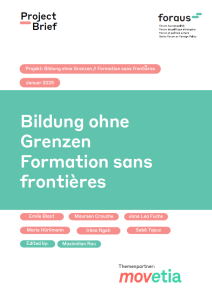Project duration
February 2023
Our project “Education without borders” aims to initiate a national debate on the future of foreign education policy, led by young people. They contribute with innovative solutions for Switzerland’s foreign education policy. A publication summarising the research results and ideas to date was published at the end of January 2025 and can be read here.
While our country is facing a shortage of skilled workers (#Fachkräftemangel), it has also been excluded 2014 from Erasmus+, the flagship program of the European Union (EU) for educational mobility. As expressed by the federal government and the cantons in their strategy on exchanges and mobility: At the societal level, exchanges and mobility significantly strengthen understanding between cultural and linguistic communities as well as the quality and development of the Swiss educational area, contribute to Switzerland’s competitiveness and innovative capacity, and help integrate our country in a European and international context. Thus, educational exchanges strengthen Switzerland as a whole, in terms of competitiveness, innovation and international integration. In this context, where Switzerland finds itself in a difficult political position with regard to Europe, we ask osince ourselves:
What foreign education policy should be pursued to secure the skills Switzerland needs for the future?
Together, young people in training and stakeholders will dialogue and develop innovative solutions for Switzerland. This will be done by answering our research question in a series of participatory workshops across Switzerland in the fall of 2023. The goal of the workshops is to present the findings to representatives of the new legislature after the federal elections.
Phases of the project
- May-September: Recruitment of partners and participants
- September-October: Participatory workshops in several Swiss cities with (1) young people in training and (2) stakeholders.
- November 2023 – March 2024: Analysis of the results
- April 2024 – November 2024: Discussion of ideas with experts
- January 2025: Publication of the results in a project brief
Political context
Since 2014, Switzerland is no longer part of the European educational exchange programs (see table below). Thus, Switzerland is not associated with Erasmus+ and, as a third country, has very limited opportunities for exchanges. But how did we get here? In the past, Switzerland benefited from much greater access to educational mobility programs. Indeed, from 2011 to 2013, Switzerland reaped all benefits of the European education and training programs as a full participant. In 2013, the Federal Council reiterated its support for Switzerland’s full participation in Erasmus by providing CHF 110.7 million in funding for this purpose. Switzerland then began negotiations with the EU on Switzerland’s association with the Erasmus+ and Horizon 2020 programs. However, after the acceptance of the federal popular initiative “Against mass immigration”, the Federal Council was no longer able to ratify Protocol III, which extended free movement to Croatia. In response, the EU cut off negotiations with Switzerland. Since then, these negotiations are at a standstill.
Nonetheless, since then, the debate on mobility policy in the context of education has continued and measures have been taken in Switzerland. This includes the creation of Movetia in March 2016, which became the national agency for the promotion of exchanges and mobility within the education system, with the aim of ensuring a transition until Switzerland’s reintegration into mobility programs in Europe. At the end of 2017, the Confederation and the cantons approved a joint strategy for the promotion of exchanges and mobility. Their aim: improve exchanges and mobility both in number and quality. But how can this be achieved? What foreign education policy should be pursued to secure the skills Switzerland needs for the future?
About the European mobility programs in the field of education
Erasmus+, the flagship mobility program in Europe, is an example of educational mobility. It allows students to undertake part of their education in another educational institution: either in a European Union country or in an associated third country such as Northern Macedonia, Serbia, Iceland, Liechtenstein, Norway or Turkey. Participants have the opportunity to stay abroad as part of their training while receiving a grant, the amount of which is determined by the cost of living in the destination country.
These individuals may be in various stages of their training, such as
- higher education;
- vocational education and training
- school education (including early childhood education and care)
- adult education;
- youth;
- sports.
Since the launch of the Erasmus program in 1987, 12.5 million people have benefited from exchanges as part of their training. In 2021, even as the pandemic was in full swing, 648,000 students and teachers benefited from mobility, 59% of whom were women. 99% of participants would recommend their mobility and 75% feel better prepared for their career.
Further readings:
- “Informations générales sur le Programme Erasmus+.” Erasmus+, https://erasmus-plus.ec.europa.eu/fr/programme-guide/part-a/eligible-countries
- “Factsheets and Statistics on Erasmus+.” Erasmus+, https://erasmus-plus.ec.europa.eu/resources-and-tools/statistics-and-factsheets
- “The Official Portal for European Data.” The Official Portal for European Data, https://op.europa.eu/en/publication-detail/-/publication/ff16650b-7b6e-11ed-9887-01aa75ed71a1
- The Federal Council. Confederation and the Cantons Adopt Common Strategy on Exchanges and Mobility, www.admin.ch/gov/en/start/documentation/media-releases.msg-id-68636.html




